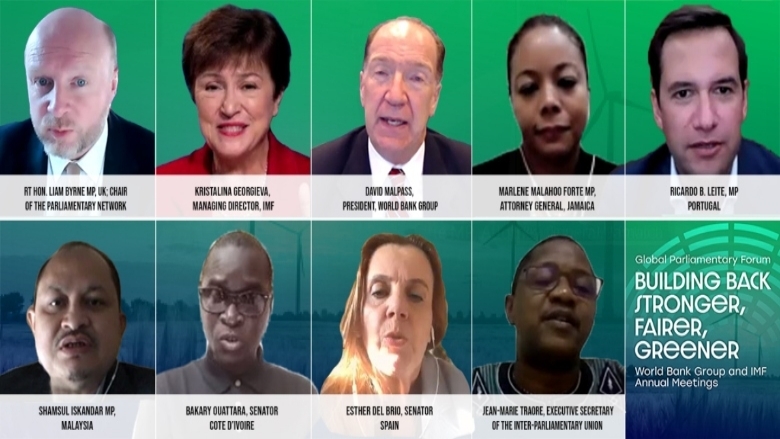The Forum, themed “Building Back Stronger, Fairer, Greener,” featured a wide range of experts in three sessions spanning October 6-8: tackling the enduring health crisis; the road to COP26; scaling up private sector investments; and a townhall on October 11 with WBG President David Malpass and IMF Managing Director Kristalina Georgieva.
For the WBG and IMF, it was an opportunity to engage with a stakeholder group that can shape the policy response, monitor progress, and ensure transparency and accountability in development. Stressing these critical roles of legislators, IMF Managing Director Georgieva noted, “You [parliamentarians] are at the frontline of policymaking, and it is through you that we get a better appreciation of the on-the-ground realities.”
WBG President Malpass also emphasized that parliamentarians are important partners in achieving development outcomes, adding, “We’ve tried to work throughout the crisis with partners—with the IMF…with parliamentarians, with governments…to prioritize our development and climate assistance towards the things that work. The goal isn’t to spend money, but to get results.”
COVID-19 vaccines and beyond
As stated by Dr. Ricardo Leite MP, Portugal and Vice-Chair of the PN, “MPs have a very important role working with financial institutions to make sure that governments understand that [COVID-19] needs to be addressed quickly so they can focus on other issues that have been left behind.”
The need for global distribution of vaccines and therapeutics was emphasized as a vital first step to halting the COVID-19 pandemic so that countries can focus on other pressing challenges, foremost being urgent action on climate change. As pointed out by Vivek Pathak, Director and Global Head for Climate Business, International Finance Corporation (IFC): “COVID-19 has vaccines, climate change does not…Climate change is also irreversible.”
Both vaccine deployment and climate change response will require global coordination and knowledge-sharing in combination with targeted laws, regulations, and oversight in countries, making MPs key actors.
Given their direct connection with constituents, parliamentarians will also be crucial to taking a human-focused approach to climate change mitigation and adaptation for just transitions that do not leave vulnerable communities behind. “We recognize that legislators and policymakers need to rethink social and economic models of development to make them more sustainable and inclusive,” said Marlene Malahoo Forte MP and Attorney General, Jamaica.
This is no small task, but a necessary one. As Dyah Roro Esti Widya Putri MP, Indonesia, stated: “The more time I spend as a parliamentarian, the better I understand the reality of the situation, but this does not stop me from ensuring that we make the right move going forward. Because if not now, then when?”
Development finance
“How do we deal with this double dilemma, to not only contend with the record levels of debt coming out of the pandemic, but also mobilize the trillions of dollars that will be needed for a just transition to the goals of the Paris climate agreement?” This was the concern of most MPs, summed up by PN Chair the Rt. Hon. Liam Byrne MP, UK.
The resounding answer from participants was the need to harness the spending power of the private sector to boost consolidated concessional financing from governments such as that offered through the International Development Association (IDA).
The private sector arm of the WBG – IFC – reaffirmed its commitment to provide financing for manufacturing vaccines and therapeutics as well as advice and technical assistance for governments in optimizing regulations, incentives, and domestic capital markets. “You can count on IFC to strengthen the dialogue and the work that we are doing with parliamentarians because without you, we cannot transform society,” assured Makhtar Diop, Managing Director, IFC.
Meanwhile, IDA20 is focusing on Building Back Better from the Crisis to help countries recover with grants and concessional financing to the poorest countries from July 2022 – June 2025, and the IMF is encouraging donor countries to voluntarily channel part of their $650 billion in Special Drawing Rights (SDRs) to support rebuilding efforts in member countries. WBG and IMF senior leadership sent a plea to parliamentarians to advocate for an ambitious IDA20 replenishment and to redistribute SDRs to support poorer countries in meeting their significantly higher financing needs.
As the world faces ever more complex and interconnected development challenges, it is increasingly evident that no one country can flourish in isolation. The GPF is just one platform provided by the PN, WBG and IMF to support parliamentarians in our shared mission to reduce poverty and boost shared prosperity for the people we all serve.
Watch the replays via our VR Atrium: https://wbgvr.org/GPF2021
Read more about the World Bank Group and parliamentarians: www.worldbank.org/en/who-we-are/parliamentarians



